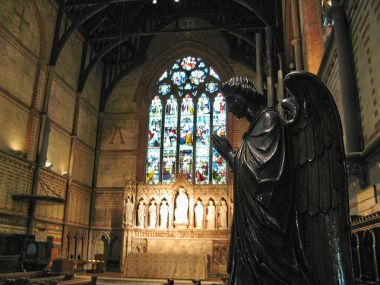Sacked New York seminary professors back to work, for now
The crisis at New York's General Theological Seminary (GTS) took a step toward resolution as eight professors in dispute with the prestigious college agreed to return to work.

Bishop Mark Sisk, the chair of the school's board of trustees, invited the 'GTS Eight' to return to their posts in a "provisional reinstatement" pending the outcome of negotiations.
The professors went on strike in late September, accusing the seminary's dean, Very Rev Kurt Dunkle, of fostering a climate "fraught with conflict, fear, and anxiety". They said he was authoritarian and that he had made inappropriate sexual, racist and anti-gay remarks. However, the GTS board deemed them to have resigned, triggering a boycott of the institution by academics including theologian Stanley Hauerwas, who pulled out of a lecture programme there, and widespread recriminations about the handling of the affair. Dean Dunkle remains in post.
They agreed to return after negotiations including the offer of a neutral person from a Mennonite group to facilitate conversations between the two sides.
In a letter to Bishop Sisk, they spoke of the need for a "long-term process of reconciliation" at the seminary. They added: "We also commit with energy to the holy work of reconciliation which we understand to be very important for the health of the entire institution and all of its constituent members: faculty, board, administration, staff and students alike."
They also asked for the appointment of an independent "ombudsperson", saying: "This will help all of us to feel less on edge and safer, and so will be an indispensable means of helping the process of reconciliation to work well."
The move effectively means that a cooling-off period has been agreed. However, the professors' letter also makes it clear that during this period "all of the parties' respective legal arguments and positions will be reserved", which means that none of the issues at the root of the problems at GTS have been resolved.
The affair has also highlighted divisions among the GTS board, with New York Bishop Andrew Dietsche issuing a statement regretting that the striking faculty had not been reinstated unconditionally. He said: "Throughout this process, I have been single-minded in my conviction that there was no imaginable way to reconcile or resolve this matter without first giving unconditional reinstatement to the eight striking faculty members. It also became clear to me that by the decision to terminate the faculty, the board had so inflamed the situation that the board itself had become a participant in the conflict, and in ways that were impeding the hope of a just and fair resolution of the crisis."
He said that there had been a strong momentum in the board for unconditional reinstatement, but that "In the end, however, the more qualified resolution carried by a wide majority, so much so that when it was asked that the vote be declared unanimous, those who opposed the resolution allowed that to carry. I regret that now, for by doing so we obscured the dynamic of debate and persuasion within the board itself, and hid from view the genuinely wide diversity of thought and conviction across the board."
One trustee, Jeffrey Small, resigned from the board because he supported permanent faculty reinstatement.











